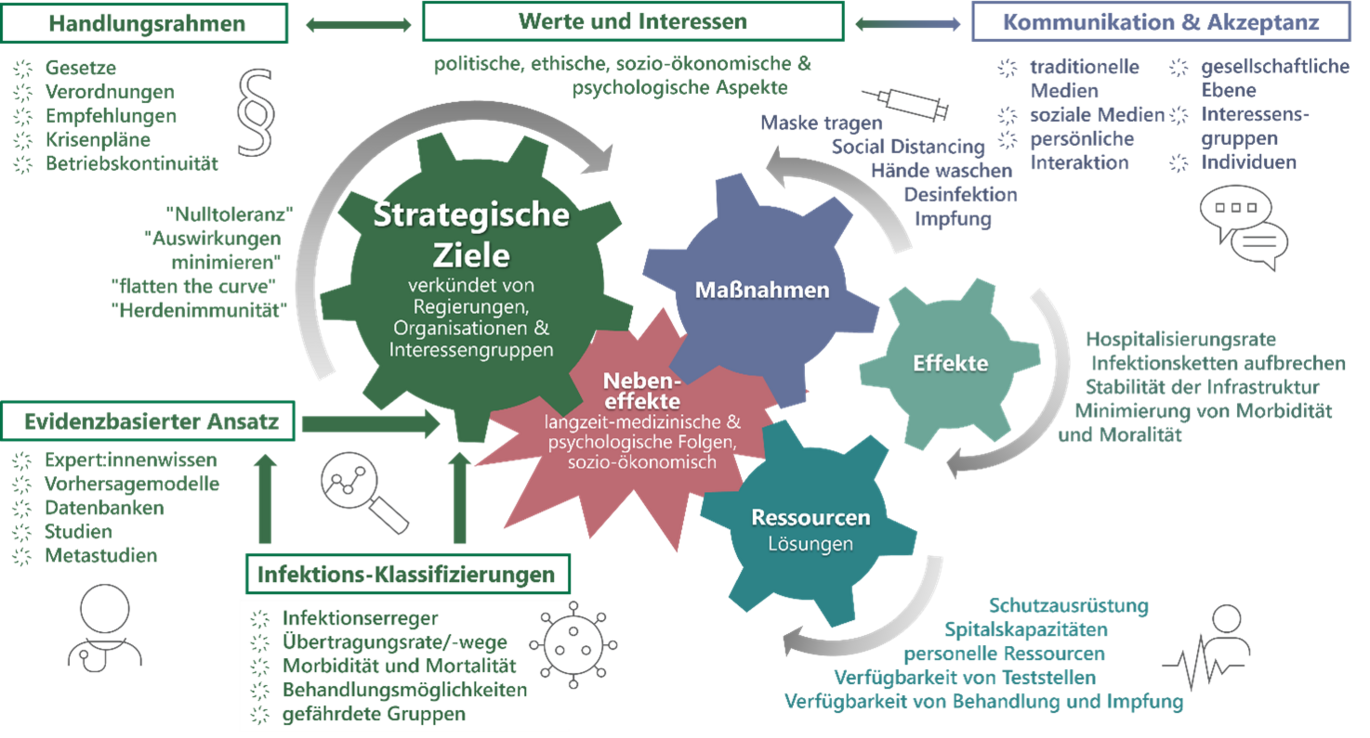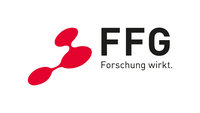National and international data, approaches and experiences of the current COVID-19 crisis will be analysed in the project to identify both immediate effects and far-reaching consequences in order to be able to assess upcoming scenarios. To this end, a technological concept (tool) is being created that specifies the respective steps in pandemic management in order to adapt measures to the given situation and anticipated scenarios. This measure matching as decision support should be able to be based on the existing "Portfolio of Solutions" (POS) framework platform. The POS platform enables user-friendly, clear dashboard displays for targeted and needs-based analyses, models and decisions by means of semi-automated links.
Current developments
"ROADS to Health" is currently in the second half of its term and significant progress has been made.
The activities in the first half of the project aimed, among other things, to record and catalogue different characteristics of parameters that a pandemic or similar disease event can have. These characterising parameters include epidemiological, social, cultural and political factors, which are collected and categorically entered into a matrix.
The following figure shows a simplified representation of the complex interplay of the various factors of a pandemic with regard to the project focus:

All of the factors shown here should be taken into account in the ROADS decision support tool in order to be able to make evidence-based decisions for society as a whole. The cogwheels in the centre of the illustration represent changing and mutually influencing aspects that are specified and/or suggested during matching. The surrounding points represent important framework parameters that act as societal-dynamic influences on the concept.
Work packages 2 and 3, which deal with strategic, tactical and operational objectives and measures, including side effects, during the COVID-19 pandemic, were successfully completed and form the basis for the development of the technological demonstrator tool.
The development and testing of the designed tool for the target-oriented allocation of measures is the focus of the second half of the project and the demonstrator is currently being validated and revised with the help of stakeholder workshops and expert feedback.
The project will be completed in March 2025.
Advisory Board
Valuable insights and feedback were gathered from the experts on the ROADS Advisory Board in numerous interactive stakeholder workshops. The increased collaboration with selected stakeholders not only led to the optimisation of interim results, but also helped to further sharpen the larger project goals and confirm the strategic direction of the project. The following table provides an overview of the ROADS Advisory Board experts who have agreed to their names being published.
| Organisation | Experts |
|---|---|
| Federal Ministry of Defence, Military Command STMK | Fruit. Rudolf Wabnegg |
| Federal Ministry of Defence, National Defence Academy | DI Johannes Göllner |
| Caritas Care Lower Austria East | Gabriela Hackl |
| Caritas Vienna | Dr Thomas Wochele-Thoma, MSc |
| Specialist in anaesthesiology and intensive care medicine | Dr Christopher Beham, MSc |
Office of the Styrian Provincial Government | Dr Thomas Amegah, MAS(ÖGD), MPH |
| Elisabethinen Hospital Graz | Dr Michael Weldi, MSc MBA |
| Paracelsus Medical University Salzburg, Red Cross Tyrol, Medical University Innsbruck | Prof Dr Franz Allerberger |
| Austrian Red Cross, Department of Operations and Health | Thomas Seltsam |
| Research Institute of Molecular Pathology (IMP) | Dr Marcus Dekens |
| Karl Landsteiner Private University Krems | Dr SusanneRabady |
Publications
The project team has worked intensively on dissemination activities for the project content. Through a variety of public appearances, publications and presentations, the preliminary findings and successes were shared with a wide audience. These endeavours not only contributed to the public visibility of the project, but also promoted the exchange of knowledge within the specialist community.
Day of Parliamentary Research 2023: Conference report - Day of Parliamentary Research in Vienna, 26/06/2023
IDIMT-2023 New Challenges for ICT and Management, page 29 - IDIMT Conference in Hradec Králové (Czech Republic), 06.09.-08.09.2023
Disaster Research Symposium - Proceedings 2023, page 68 - Disaster Research Symposium in Leoben, 11 and 12 September 2023
Global One Health Symposium Wageningen - Proceedings 2024, page 112 - Paradigm shifts for Global One Health in Wageningen (NL), 23-25 April 2024
IDIMT 2024: Changes to ICT, Management, and Business Processes through AI, page 13 - IDIMT Conference in Hradec Králové (Czech Republic), 04.09.-06.09.2024
The FFG is the central national funding organization and strengthens Austria's innovative power. This project is funded by the FFG. www.ffg.at
Last updated: 29.01.2025
automatically translated







